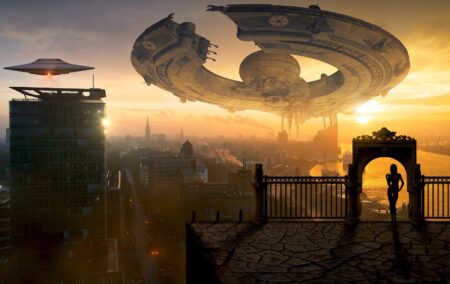Imagine, if you will, South Africa as an influential and technologically advanced member of an alliance of the world’s most powerful nations which act as leaders of a world ravaged by war. Sounds a bit farfetched, doesn’t it – especially given the current state of the economy (which has been declining for over a decade now) and the recent unrest.
But it wasn’t always such a mad thing to envision. Consider the science-fiction television series, Babylon Five, broadcast in the 1990s, set on a space station designed to act as a bridge between different species, including human beings. The backstory to the series (considered by some to be a rival of shows such as Star Trek in quality and vision) imagined a future with a unified government over Earth. The imagined future history had seen a number of great powers, including the United States, Japan, the United Kingdom, and Australia, come together to form the ‘Earth Alliance,’ in 2085 in the aftermath of World War III. In the backstory of the series South Africa is one of the technologically advanced and influential powers which helps form the beginnings of this world government.
But, one must ask, would a science-fiction author or scriptwriter dreaming up future scenarios for the world today identify South Africa as one of the world’s leading countries?
Of course, much has changed since J Michael Straczynski created Babylon 5 in the 1990s. It is unlikely that our hypothetical creator would exclude countries such as India and China when imagining who would be at the forefront of driving a global alliance.
But if he or she were looking for an African country to include in an advanced and influential group of nations, South Africa would be unlikely to be the country to come to mind. Certainly, in imagining which African countries likely to be global leaders a century hence, we would be behind places like Kenya, Ghana, or even Nigeria.
And that brings me to my question – what country are we today? And what kind of country do we want to be?
The country that South Africa was in the 1990s and 2000s is quite different from what we are today and certainly how we are perceived abroad. Some fifteen years ago South Africa was seen as a rising star in global terms. The country was spoken of in the same breath as dynamic emerging markets like Malaysia and Taiwan. People like Thabo Mbeki and Trevor Manuel were praised for their sound economic management and South Africa was a darling in global markets. Some will sniff at invoking the names of Mbeki and Manuel and their ‘neoliberal’ economic policies but under their economic tenure, on any metric you care to look at, the lives of all South Africans were improving.
South Africa was in some ways like Brazil, our Lusophone cousin across the Atlantic, a ‘country of the future’ – though we differ from Brazil, which is spoken of as ‘the country of the future, and (will) always be’. Perhaps when it comes to South Africa today, it would be more accurate to say, ‘South Africa is not the country of the future and it never was’.
South Africa has squandered much of the promise it had a decade and more ago. Prudent financial management of the country’s finances ensured that there was much ammunition in the country’s fiscal bandoliers to weather the 2008 financial crisis. Contrast that to the financial pressure brought on by the Covid-19 pandemic and the government’s tepid response. We are now a country which will probably struggle to pay its bills very soon.
We are a country where militias roam the streets to protect property and lives, as seen in the riots and unrest from last month. But it must also be pointed out that we are also now a country where large swathes of people see no future for themselves or their families. Hopelessness is not something that leads to a functioning and prosperous society and it is clear that South Africa has hopelessness in abundance – again a far cry from the situation at the turn of the last decade.
We are also a country where minorities (and not just whites) are scapegoated and one’s belonging seems to be increasingly a matter of skin colour rather than citizenship. One need only look at some of the vile invective aimed at Indian South Africans following the unrest last month, not least from our third-largest political party, and the complaints by the sports minister that the squad that participated in the recent Olympics was not representative.
Returning to our hypothetical science-fiction writer – if he was imagining today a world one hundred from years now, given what I have described here (a small selection of what ails our country), would he imagine South Africa as one of the globe’s leading lights at that future point? The answer is almost certainly no.
Yet South Africa can once again become a ‘country of the future,’ and one which people can easily imagine as being prosperous and developed in years to come.
That will need hard decisions to be taken today – just as hard decisions were taken in the 1990s to enable South Africa to make the progress it did in the first decade of this century. However, it is not clear that the ANC of today has what it takes to make these hard decisions – the recent cabinet reshuffle has shown the party is out of ideas, out of talent, and out if its depth.
South Africa can once again be the country of the future – but not while the ANC is in charge.
If you like what you have just read, support the Daily Friend
Image by Stefan Keller from Pixabay

